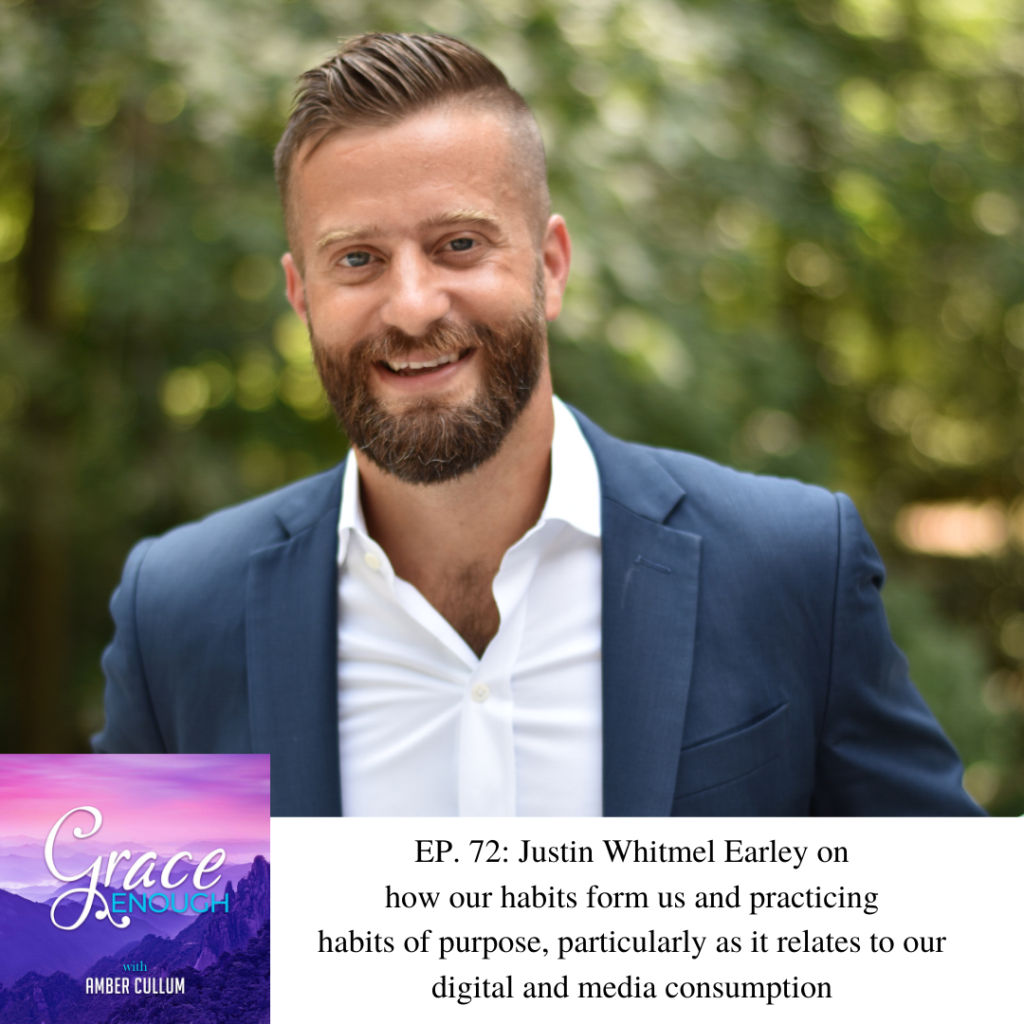
Justin Whitmel Earley graduated from the University of Virginia with a degree in English Literature before spending four years in Shanghai, China, teaching and writing.
He got his law degree from the Georgetown University Law Center and now practices business law, writes and speaks in Richmond, Virginia.
He is married to Lauren and has four sons – Whit, Asher, Coulter and Shep.
InterVarsity Press published his book on formational habits, The Common Rule – Habits of Purpose for an Age of Distraction, in 2019.
You can learn more about cultivating a formational set of habits at www.thecommonrule.org and more about his law practice at www.earleylegalgroup.com.
Justin and I chat about habits and how they form us. We chat about practicing habits of purpose particularly as it relates to our digital and media consumption.

*Justin’s book recieved the 2020 Book of the Year Award from Christianity Today
“I did have my serious wanderings in late High School and early College. I describe it as the period for me where I personally never really doubted that the claims of Jesus were true, I did experientially wonder if they mattered and if they mattered to me. Through some significant moral failure, and realizing that I was less happy… and more ashamed, living the way I was living. Finally I had my ‘I’m gonna follow Jesus, not just because my parents said’, but for myself in early college. And it was really because I started to think about who I was becoming. I realized I don’t like who I’m becoming, but I like who my dad is. I like who my parents are. And just because they modeled a life of following Jesus.”
“I look back now and I think the house of my life was very sincerely decorated with the Christian content of calling, but I look back now and I also realize that the architecture of that life was exactly like everyone else’s. I completely assimilated to all the typical practices of a top 20 law school, an aspiring young lawyer, just busy all the time. Always waking up earlier. Always staying up later. Always adding more. And that worked in a sense. I graduated around the top of my class and got my dream job at an international law firm doing mergers and acquisitions. And, you know, life was going well, of course, until it wasn’t.”
“How is it that this missionary to law and business became converted to the nervous medicating warrior, and especially in such a short order? The answer for me…was by habit…. After about a year of this, I realized that my my body and my mind, and all the anxiety that wrecked it, was happening because I had finally become converted to the anxiety and the nervousness and the busyness that my habits and routines worshiped. I was being formed in anxiety even while I was in my head clinging to the gospel piece of calling.”
“I think our cultural moment is familiar with the significance of worldview. For example, what we believe about the world has a serious impact on our life. But I do think we’re less acquainted with the idea that the practical ways we live have significant impact on who we become.”
“Our brain becomes attuned to certain habit activity such that our head thinking can go one way, but our habit activity can go the other way and that’s very normal. Then, I started digging into the theology of this and realizing that when your head goes one way and your habit goes the other way your heart follows the habit.”
“It is possible to believe all the right things, but but very unwittingly, worship idols of productivity, busyness, exhausting yourself to earn the approval of others just through the little habits of the ways you check your emails or never turn off your devices or never schedule a day off.”
“We are often connected to people, but we are very rarely actually present with people.”
“I recommend that and almost everything else I recommend, because of the ways I fail at it.”
“We wake up and our heads are asking our phone a really simple question, which is what do I need to do today? But our hearts…this is not totally conscious, or verbalized even, our hearts are asking a really different question, who do I need to become today in order to be lovable? Anything will be happy to answer that question for us, especially the phone.”
“Whether we approach our phones looking for love or set out to them to share love makes a world of difference in how we use them. For me, the practice of Scripture before phone is one of those keystone habits to help check myself on what I’m doing when I go to my phone.”
Techwise Family by Andy Crouch
“We tend to think in America that freedom is the way to the good life and that freedom comes by resisting any limitations. However….the idea of biblical freedom is that it doesn’t come by getting rid of all limitations, it comes by living under the right ones.”
“You [have] to do a pivot in your mind to understand that the good life comes through not having whatever you want, but having the ability to do what you’re made for.”
“If we don’t curate our media, our media [will] curate us.”
“News media understands that anger is addictive and that shock will bring you back and they curate accordingly. Again, you curate it or it’ll curate you.”
“The one that kind of stuck out the most is thoughts just kept passing is just to share from my current life moment and remind my great grandchildren, that life unfolds slowly and over the long haul, and it should.”
© Grace Enough Podcast2024